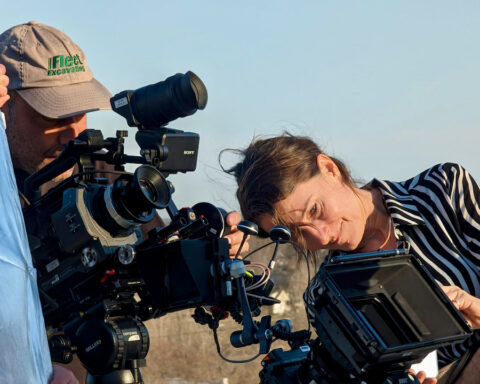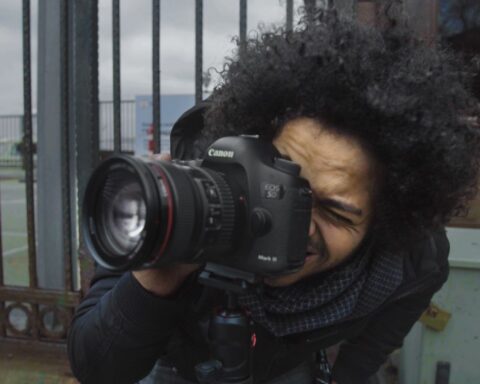This article was selected for inclusion in the 2014 edition of the Best Canadian Essays anthology.
Dragon was the kind of guy who carried three cell phones in his pocket and spoke four languages, none of them very well. But he spoke with a confidence that made you listen. His nickname referred to the mottled tattoo on his shoulder, and he managed to live up to it. Tough and wily, he was a North Korean broker who guided defectors escaping from North Korea into Asia. He liked to call himself a humanitarian; others might say he was a human smuggler.
I wasn’t sure what to think of Dragon, but I had hired him and hitched my wagon to his in order to film undercover with his group of escaping defectors. We had travelled 1,400 km from the North Korean border, and had stopped for a night at a small apartment safehouse in central China, a two-bedroom affair with linoleum floors and curtains drawn in every room. It was a relief to be indoors after having been on buses and trains for days. None of the defectors had proper ID and we had been travelling in constant fear of inspections. If discovered, the defectors would have been arrested and deported back to North Korea.
My DP, Stephen Chung, my Chinese soundman and the group sat down on the living room floor to a dinner spread of take-out Chinese food still in plastic containers. Dragon pulled me over to the side room. “I won’t be going with you on the van trip tomorrow,” he said. Until this point, Dragon had commandeered every transfer, every bus and train. Why would he be quitting us now?
“I’m not going because we need someone around to clean up, in case something happens.”
“In case what happens?” I asked.
“Spot checks, police patrols. I mean we scouted already, there shouldn’t be a problem, but I’ll stay back just in case…you know.”
I eyed him warily. This next part of the journey was the longest leg, and the most dangerous. His sudden decision to stay back rang alarm bells for me. Only eight weeks ago, two South Korean journalists had been apprehended with a group of defectors in a passenger van. If we got caught with these defectors in the same private vehicle, we could be seen as abetting illegal migrants. Stephen and I would be detained and questioned by Chinese officials, which was frightening in itself, but it would be even worse for the others. My Chinese soundman would be jailed, and the footage we had hidden in our suitcases would incriminate Dragon and the defectors. I considered calling the whole thing off but when you’ve come this far in a film shoot, it’s hard to back out.
***
I had originally started researching for my documentary The Defector: Escape from North Korea several years ago after reading some accounts by defectors. Their harrowing flight to freedom mirrored in a way my family’s experience during the Korean War (1950–53.) My socialist aunt and uncle suffered greatly for being North Korean sympathizers and ended up fleeing to the North. There they were seen as traitors and were forced to return to the South. Property was confiscated, they were interrogated and tortured and my uncle died.
The story told by North Korean defectors reminded me of this chapter in my family history and I was deeply affected. I started interviewing defectors in North America and learned about a global network of people helping them both within and without North Korea. While it was nearly impossible to film them inside the DPRK (North Korea), I hoped to film aid workers helping defectors in other parts of Asia. However, the church groups and NGOs I met with considered it too risky for us to film them in Asia. The only people who would consider a film crew were “brokers,” whom we could hire as handlers.
We entered a second phase of casting, done over long-distance phone calls. If filming a documentary is a leap of faith, then that faith is built on trust that’s established between the filmmaker and her subjects. But how do you establish trust with people you haven’t met? I talked with several brokers over the phone as we considered various possible escape routes: Mongolia, or across China into Southeast Asia, or attempting by boat to get into South Korean waters. Each route had different risks and associated costs. After deliberating, I decided, sight unseen, to join a broker who was taking a group of five to six young defectors through China into Southeast Asia. That broker was Dragon.
Dragon said his group of defectors had consented to being filmed but we had to heed his instructions; namely, no cell phones and minimal film gear.
Stephen and I decided on DSLR cameras and packed extra batteries and drives, light panels and a portable chroma key greenscreen to have on hand for the interviews. Still, when we arrived in South Korea, Dragon’s eyes popped when he saw our bags. “What are you doing, filming a Hollywood movie?!” We had to pare down our equipment and repack. Finally we were ready to set off to meet with the defectors.
We arrived at a small Chinese farmhouse near the border of North Korea, where bleached grey grass lay flat in the fields. Inside the farmhouse a sack of rice was leaned up against the doorjamb. Brown lacquered clay urns were lined up along the wall.
Five defectors were huddled on some rumpled blankets on the floor. They had been waiting for more than a day for Dragon to arrive. As I looked at their faces, I realized that not only did they not expect a film crew, they clearly didn’t want to be filmed. Dragon had lied.
I looked at the five morose North Koreans, not knowing what to do. Luckily, the farmhouse owner had cooked up a large pot of chicken congee and he passed around the steaming bowls. We sat down on the floor to eat.
Eating together is perhaps the best way to break the ice on a shoot. Dragon told stories of when he escaped from North Korea and called himself their ‘older brother,’ saying he’d look after them. He pointed to me, saying I was their ‘older sister’ from Canada and that I would help them out more than they would know. He charmed everyone, bringing them on side for the sake of the shoot; I was grateful.
One young woman, Sook-ja, shared her moving story about how she escaped across the border to search for her missing sister. Her sister had ended up falling into the hands of Chinese traffickers and Sook-ja was close to despair since none of her contacts in China knew where her sister was now.
Another woman, Yong-hee, had been duped and sold to traffickers by a family friend. Like 80 to 90 percent of North Korean women defectors, Yong-hee was sold as a bride to a Chinese man. (The gender imbalance in China, caused by their one-child policy, has created a demand for North Korean women.) She ended up in a rural Chinese village where she met other North Koreans, and through word of mouth, she learned about brokers like Dragon.
Trust grows swiftly within a group when there are lives at stake. Over the next few days, we travelled and ate together and the defectors shared their stories. They consented to filming but wanted us to conceal their identities; I assured them we would. Stephen set to work on devising creative ways to film. The DSLR cameras were great as they also enabled us to film in uncleared locations such as trains and bus stations, where we rolled with the cameras slung around our necks. Our soundman cleverly slung his portable recorder in a pouch and simply stood close to people as they spoke.
I became quite attached to Sook-ja and Yong-hee and they with me, so when Dragon decided not to continue on the journey midway, we grew closer. Unlike Dragon, we were new to this journey, and we faced the unknown together. Travelling for days in a group, we separated at the Laotian border, and with the help of Dragon’s contacts we arranged to meet in Thailand. The group encountered a few mishaps and were delayed; my opinion of Dragon dropped to an all-time low. When we finally met and embraced in Thailand, I made arrangements with Sook-ja and Yong-hee to meet in South Korea, where they expected to be sent.
***
Months passed and I heard no news from Sook-ja or Yong-hee. I finally called Dragon in Seoul.
“They’re here,” he said. “They’re in Hanawon, and should be out in a few weeks.” Hanawon was the North Korean refugee reception centre in South Korea. Refugee claimants are able to make phone calls, so I wondered why the women hadn’t called me.
“Don’t worry,” said Dragon, “I’ll call you when they’re released.”
True to his word, Dragon called when he found out the day that Sook-ja and Yong-hee would be released. I flew to South Korea and met Dragon, who told me the women didn’t want to speak with me. At first I didn’t trust him, but he then called them and passed his cell phone over.
“Oh, sister, it’s good of you to come all this way,” Sook-ja said. “But I can’t be in your movie anymore. I heard our families will be severely punished if they know we defected to South Korea.”
I was saddened, and conflicted about her change of heart. I cared about her and didn’t want to put her family at risk; yet, we had taken precautions to guard her anonymity all along. Nothing had changed in our approach but she had changed her mind.
Then Sook-ja made a request that surprised me. “Dragon’s been hounding us for money, sister. Could you speak to Dragon on our behalf?”
“What money?” I asked.
“Broker fees.”
It turns out all North Korean defectors accepted into South Korean society are given a government stipend upon release from Hanawon. Most of these funds end up being paid to the brokers they hired. Dragon wanted them to hand over his broker fees.
I hung up and stared at Dragon. Documentary filmmakers aren’t supposed to get involved in their stories, I knew this, but couldn’t help but ask, “Can’t you give these girls a break?”
Dragon blew smoke in the air. “Are you kidding? Most brokers charge $3,000, $5,000. I’m asking way less. They knew they had to pay a fee but now that they’re here, and free, they don’t want to pay.”
I sat with this. Dragon, in his own way, was principled. True, he ferried defectors across borders illegally, and where this line of work sits in the moral universe is another complex discussion. But Dragon, like all brokers, took on significant personal risk to guide the defectors. Of course a broker isn’t as sympathetic a figure as Sook-ja and Yong-hee. But even Dragon needed to keep his identity concealed, for unlike the other defectors, he would go back into China again and again. Despite this, he remained committed to the documentary, delivering everything he said he would. He led the defectors out of China as he promised; now he wanted them to keep their end of the bargain.
Dragon was and still is a complicated figure in a documentary where we were privy to seeing many things considered illegal – including North Korean defectors hiding in China and Laos. As a filmmaker, I tried to portray the complexity of the situation. As a fellow human, I witnessed the courage of a handful of desperate people and found myself swayed by conflicting interests. More than once, this film made me challenge my assumptions and correct my position. It was a dialectic and revelatory process in which I see-sawed my way to a new understanding of their world. And isn’t that what lies at the heart of documentary filmmaking?











